Anode Rods Delay the Inevitable
All submerged and buried metals inevitably lose their mass and their strength. When metal surfaces come into contact with electrolytes, in water or soil, they undergo an electrochemical reaction known as corrosion which eats away at the metal.
One of the known victims of corrosion is water heater tanks. They possess all the magical ingredients needed for corrosion—water, metal, and oxygen. Despite this, water heater tanks can last a decade without much rust. How does that happen? With barrier, strength, and sacrifice. We have created a line of defenses to help metal tank last longer.
Best Defense Against Corrosion for Water Heater Tanks
Glass Coating: Inside, the tanks are lined or coated with glass—this lining prevents contact between the tank's steel and the water. But the glass coating is not perfect just like anything in this goddamn universe. Glass coating may have pores or imperfections that may expose the steel to water. This is where the second line of defense comes in—sacrificial anodes.
The principle behind sacrificial anode protection is Bimetallic corrosion. Bimetallic corrosion, as its name suggests, is a type of corrosion that occurs when two different metals are paired together. One metal experiences accelerated corrosion while the other remains protected. To put it another way, one metal sacrifices itself so the other can last longer.
This is possible because the two metals form an electrochemical cell where one becomes the anode (the sacrificed metal) while the other becomes the cathode. By understanding this process, it is possible to force this type of reaction in real-life structures. By carefully selecting and pairing two different metals, we can purposely make an object the cathode, ensuring that it remains protected so long as it is connected to a sacrificial metal (the anode). Cathodes hold on to electrons, preserving the metal structure while anodes readily give up their electrons, destroying the metal structure. Metal that gives up electrons (anodes), corrodes.
To prevent corrosion of the water heater tank, we must make steel hold on to its electrons. We do this by introducing another metal—more reactive, more eager to give up its electrons. This metal will give up its electron and deteriorate for steel. They are referred to as sacrificial anode because of their seemingly sacrificial purpose.
A sacrificial anode is like knight sacrificing himself to a dragon for the well-being of his townspeople. I know, I know... that's a weird analogy for an engineering problem, but, hey, it's good to keep a day topic like this light sometimes!
A Better Alternative: Powered Anode Rods
Sometimes, sacrificial anode rods are not good enough. For large tanks, long pipelines, large ships. For such structures an external DC electrical power source is used to provide sufficient current to overpower corrosive and protect the metals. But for domestic water heater tanks purposes, sacrificial anode rods proves sufficient and inexpensive.
This is my go-to water heater rod:
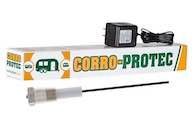
It's a bit pricey but it's worth every penny. You will see why in my lengthy discussion below on powered anode rods. If you don't feel like shelling out that much for a powered anode rod, here's a slightly cheaper alternative that's also pretty good:
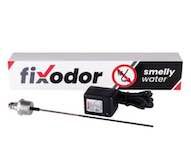
How Frequently Do Sacrificial Anode Rods Needs Replaced?
Your tank-style water heater relies on an anode rod to keep working reliably. They should be replaced every 3 to 5 years. If you don’t replace your water heater’s sacrificial anode when it’s all chewed up, you could have to deal with stinky water and other consequences.
Anode Rod Bimensions
The diameter of all residential water heater anode rods is 3/4 inches. However, the length and type of the anode rod made are not the same. Some anode rods are 33 inches in length while others are 44 inches in length. You may need to cut it down to fit your water heater if you have a smaller tank.
Sacrificial Anode Rods
Magnesium Anode Rods
Magnesium anode rods are the most common anode rods used in residential water heaters. They work well in soft water, water with fewer electrolytes. In Hard water, the rods corrode quickly so you might have to replace your anode rod before the standard three years period.
If your water is Alkaline, a magnesium rod can help reduce some of the scales that form inside your water tank due to the high alkalinity. Magnesium rods are also recommended when there are high levels of chlorine and chloramines in your water.
If you start noticing a trashy smell coming from your water heater, have your plumbing professional check out the anode rod. If they notice clear, gray, or blue gel or beads at the bottom of your water tank or anode rod, your aluminum anode rod is reacting with the high chlorine levels in your water to create aluminum hydroxide. Switch to a magnesium anode rod to get rid of the beads and the stench.
Aluminum Anode Rods
Aluminum anode rods were the most commonly used rods back in the day. As we found out more about the poisonous effects of aluminum on our brain and our body, the application of aluminum has been greatly reduced. Therefore, you should avoid cooking and drinking from water heaters if you water heater tank has an aluminum anode rod or when you don't know which type of rod you got lurking in your water heater tank. You could find out by trying to bend the anode rod. If it bends, it is aluminum.
Sometimes the water coming from the water heater can smell like rotten eggs. There can be many different reasons for this. One of them is that you have a high concentration of sulfate in your water. Sulfate reacts with magnesium to form magnesium sulfate, which is infamous for its rotten egg smell.
If you are tired of your colleagues talking behind your backs about how you smell like rotten eggs, you better change that magnesium anode rod of yours.
Zinc Anode Rods
Zinc anode rods are essentially aluminum with a small amount of zinc. Although zinc rods do not usually come with a water heater, they can be easily installed. They are particularly a good option if you have sulfur smelling water coming from the tank. You won't generally find a pure aluminum anode rod anymore so you can basically think of zinc as aluminum and vice versa as these rods will contain both metals ninety-nine times out of one-hundred.
If you're dead-set against powered anode rods or just looking for something that's affordable, I recommend zinc/aluminum over magnesium. This is a solid zinc/aluminum anode rod for the price:
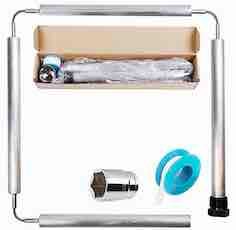
This rod even comes with a kit so it's much easier to install than buying the rod and trying to go it alone. If you're already pretty handy, this is also a solid brand to buy:
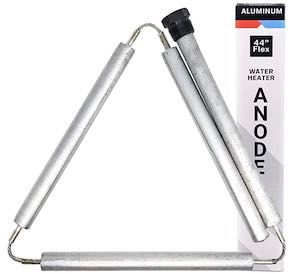
Powered Anode Rods
Titanium Anode Rods
Our buddies, sacrificial anode rods, do not use any electricity but powered anode rods do. Electric current pulses through them. Keeps them alive. Unlike suicidal rods, powered anode rods do not wither away in favor of the steel, instead, they use the endless supply of electrons to preserve their metallic bonds.
Titanium is usually used as non-sacrificial, powered anodes. Powered anode rods last longer than sacrificial anode rods. They do not get spent. They can work with soft water or hard water. They can protect any size water tank. And most importantly, yes, your water won't stink because of magnesium sulphate.
The amount of current delivered increases as your water tank degrades. Powered anodes can act as low-water sensors and monitors of water-tank integrity. When the DC current is as high as it can go, you can expect your water tank to fail very soon.
Despite being so awesome, people do not normally use powered anode rods for water heater tanks because they are expensive. Significantly more expensive than sacrificial anode rods. They are definitely fancier though, and better. Corro Protec powered anode rod is the best one you can get online.
Zinc/Aluminum vs. Magnesium Anode Rods
Cost
Although both aluminum and magnesium are pretty abundant on our planet, magnesium is difficult and therefore expensive to extract and refine. Therefore, aluminum rods are generally a cheaper option
Effectiveness
Because aluminum corrodes more slowly than magnesium, it may not be enough to combat corrosion in some water heaters. Your heater may slowly start to rust, despite having a functioning anode rod.
Replacement Frequency
Magnesium is more reactive and therefore their anode rods corrode faster. They have to be replaced sooner than aluminum rods.
Ease of Installation
When an aluminum rod erodes, it swells. Really old, used up aluminum anodes can be nearly impossible to remove because the swelling has made them fit so tightly into their fixtures. Magnesium rods don’t have this problem. They’re generally quite straightforward to remove and replace.
Sediment Buildup
Whether you have an anode rod or not, sediments will always build-up at the bottom of the tank due to corrosion of either anode rod or steel tank—if anode rod is not present to sacrifice itself.
Aluminum anode rods particularly cause great annoyance with their sediment. A layer of sediment that has accumulated at the bottom of your water heater tank can cause your water heater to run loudly. Some people report that it even wakes them up during the night.
If allowed to build up too long, sediments can hamper your water heater’s performance and eventually travel through your pipes and cause trouble throughout your plumbing system.
Floating byproducts also occasionally form. These are sticky and can mess up the functioning of water filters and tap aerators. If consumed, sediment from aluminum anode rods is also a potential health hazard. Magnesium anode rods are definitely better in this regard.
Health Concerns: Aluminum Toxicity
For most people, aluminum is not as toxic as heavy metals. Aluminum is classified as a non-carcinogen by the United States Department of Health and Human Services. There is little evidence that normal exposure to aluminum presents a risk to healthy adults, and there is evidence of no toxicity if it is consumed in amounts not greater than 40 mg/day per kg of body mass. Most aluminum consumed will leave the body in feces; most of the small part of it that enters the bloodstream, will be excreted via urine. But it can cause toxicity in large quantities.
Magnesium is actually healthy for your physiology. Among many other things, it can fight depression and lower blood pressure. So as far as health is concerned, installing magnesium anode rods in your water heater is a much better option.
What's That Bad Smell?
When magnesium corrodes, it can lead to the formation of hydrogen sulfides which smells like rotten eggs. The zinc anode rods are great at neutralizing the strong, unpleasant smells often created when metal gets together with water.
Conclusion
Magnesium anode rods are easy to install. They don’t produce nasty sediment problems, and they’re reactive enough to neutralize problems in acidic water. And they don’t pose any health risks, should you consume hot water from your taps… in fact, having one installed is ultimately good for your body. They may be a bit more expensive, and you will have to replace them more often. But we definitely think it’s worth it.
But if you want something cheaper or your water smells terrible, zinc/aluminum anode rods you should get. If you do install an aluminum rod, don’t use the water for cooking and drinking.
Frequently Asked Questions (FAQ)
How do sacrificial anode rod works?
Since water wants to attack the steel-lined water tank and any metal pipes in your home, a more reactive (least noble) metal is chosen for the sacrificial rod.
The sacrificial anode rod will corrode away completely before the water begins to attack the steel water tank. As long as anode rods are regularly checked and replaced, your water heater tank will be protected from corrosion.
Which anode rode is most effective?
Powered anode rods are the most effective anode rods but amongst sacrificial anode rods, magnesium anode rods seems to have an edge. Because aluminum corrodes more slowly than magnesium, it may not be enough to combat corrosion in some water heaters. Your heater may slowly start to rust, despite having a functioning anode rod.
I recommend the following powered anode rod:
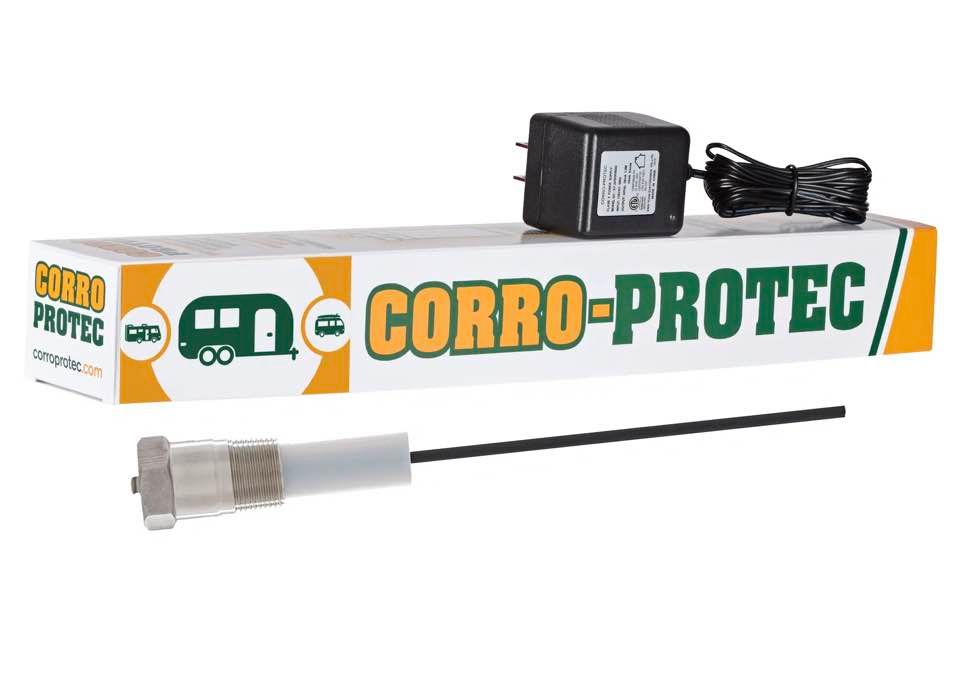
Do sacrificial anode rods use energy?
Unlike powered anode rods, sacrificial anode rods do not use any energy.
How long does an anode last?
An anode can only protect the tank while it has metal to corrode. Once the anode has been corroded, the tank will begin rusting. After around three years, you should replace your anode rod.
Does size matter?
The more magnesium or aluminum there is on the anode, the longer the protection time of your water heater tank will be.
How do I know if my anode rod has turned bad?
Smelly or discolored hot water is the biggest sign that something is wrong with your anode rod. When your anode rod has completely corroded, it can no longer protect your hot water heater linin
After how many years I should replace an anode rod?
Anode rods generally can last about three to five years but it really depends on the manufacturer, quality of your water, and how much water travels through your water heater. If you have soft water, the anode rod will deteriorate at a much faster rate.
How do I replace my anode rod?
It really isn't that difficult. You can do it on your own.
What would happen if you do not replace your anode rod?
Anode rods generally can last about three to five years but it really depends mostly on the quality of your water and how much water travels through your water heater. By checking the condition of your anode rod every 3 years, you can reduce the chances of a leak, improve the quality of your water, reduce water heater wear and tear, and save a lot of money.
